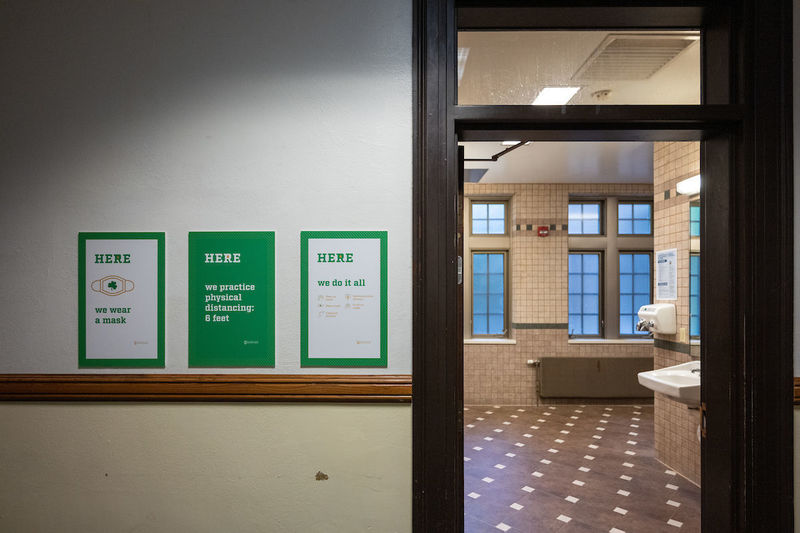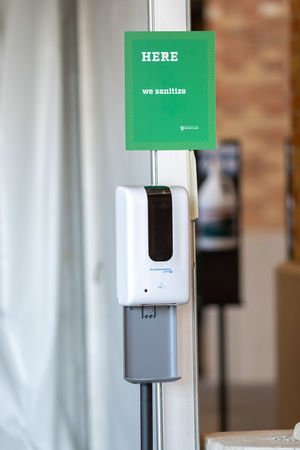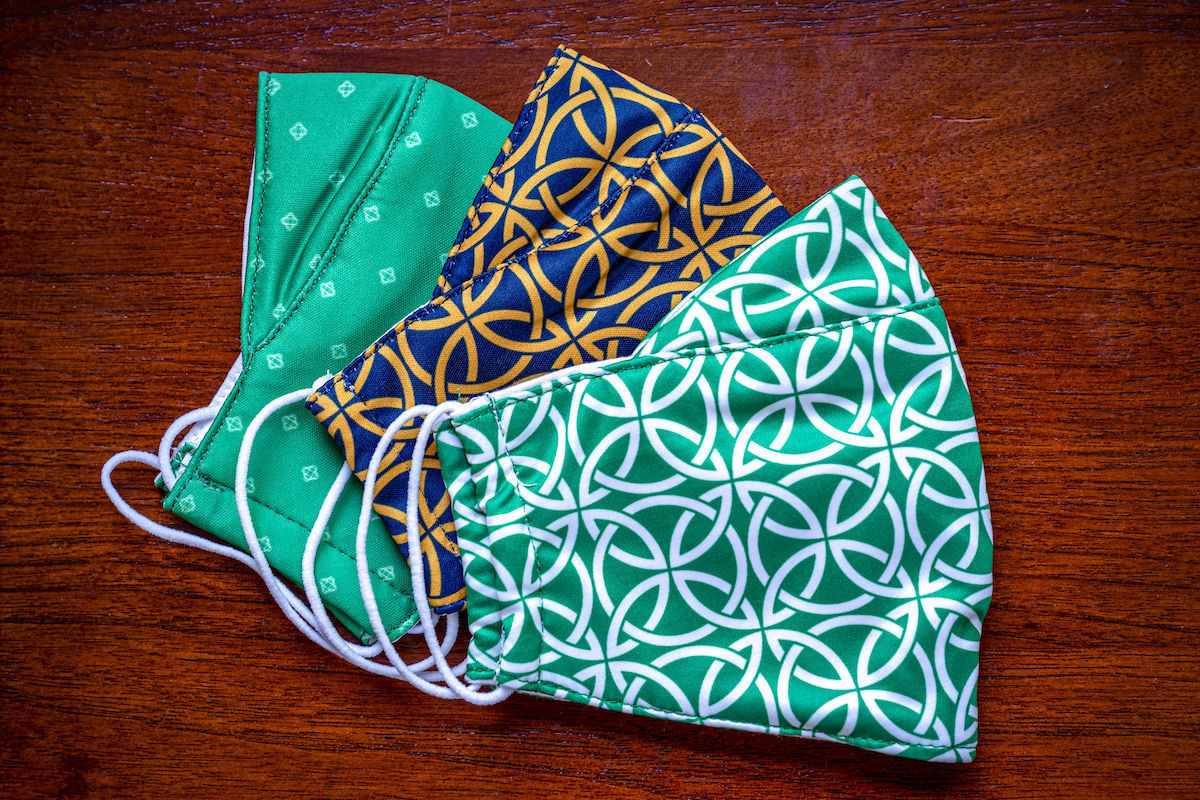 Signs across campus remind students, faculty and staff of safety procedures. Photography by Matt Cashore ’94
Signs across campus remind students, faculty and staff of safety procedures. Photography by Matt Cashore ’94

Daily temperature checks, mandatory face masks, grab-and-go dining hall meals eaten in tents on the quad, a maximum of two people on elevators, a limited crowd at football games, no in-person arts events or public lectures, and a prohibition on receptions and tailgaters.
Notre Dame is set to resume in-person classes August 10, but it will be a much different campus environment because of the continuing coronavirus pandemic.
And it will require careful attention, cooperation and teamwork by students and employees to help the plan succeed.
Thousands of signs have been placed in buildings across campus, reminding those who step inside of safe practices in the age of COVID-19, the messages organized around the word HERE, the name of the campaign promoting procedures for a safe return. “HERE we wear a mask.” “HERE we sanitize our hands.” “HERE we take the stairs when possible.” “HERE we practice physical distancing,” accompanied by an image of Touchdown Jesus demonstrating six feet of separation. A COVID-19 testing tent has been set up next to the Lou Holtz Gate at Notre Dame Stadium.
It’s all part of an intricately detailed plan, months in the making, designed to allow for the safe resumption of in-person classes after Notre Dame shifted to online classes in March at the start of the pandemic.
As the virus continues to take its toll internationally, fall 2020 is expected to be a semester unlike any other, with restrictions and rigorous safety measures in place intended to protect the health of students, faculty and staff. Precautions will include daily health checks, face masks, social distancing, contact tracing, and quarantining for those who test positive for the virus.
The plan is praised by many and is causing concern for others. The results will be monitored closely by administrators, who say they are prepared to make changes or switch back to online-only classes if the results merit it amid a pandemic that so far has killed more than 148,000 Americans.
IN-PERSON TEACHING
Faculty have been told in-person teaching will be the general standard, although individuals may submit requests for further accommodations based on age, underlying health conditions or other factors, with medical documentation required. All students and employees will be required to complete a daily health check using an online tool, with only those who are symptom free cleared to report to class or work on campus.
Notre Dame President Rev. John I. Jenkins, CSC, ‘76, ‘78M.A., announced in May that the fall semester will begin two weeks earlier than originally scheduled, the campus will forego the traditional October fall break and will end the semester before Thanksgiving.
“Bringing our students back is in effect assembling a small city of people from many parts of the nation and the world, who may bring with them pathogens to which they have been exposed. We recognize the challenge, but we believe it is one we can meet,” Jenkins wrote in a letter to students.
In the age of coronavirus, nothing is certain. The plan is being piloted with several small graduate student programs that started July 13. The University has converted and outfitted non-traditional spaces and auditoriums for classroom use to provide for physical distancing and professors will dismiss students by row at the end of each class in order to reduce congestion.
This summer, more than 20 staff teams have been working on campus, using electrostatic sprayers, pressurized and trigger sprayers and wipers to disinfect all areas. More than 7,500 gallons of hand sanitizer has been purchased, and will be available in residence halls, building entrances, classrooms and office spaces.
As students return, there will be more frequent cleaning in heavily trafficked areas, such as classrooms and residence halls, which will be cleaned seven days a week (up from five) and there will also be disinfectant sprays available for use at any time. Classrooms will be cleaned and disinfected overnight and disinfected at least twice more during the day and stocked with disinfectant spray for others to use at any time. In addition to regular cleaning, office spaces will be stocked with disinfectant spray.
Students and employees are being asked to actively join in the effort. After using a microwave or opening a refrigerator, for example, campus members are encouraged to spray that surface with disinfectant and wipe it to protect the next person.
Trained employees, referred to as HERE ambassadors, will be assigned to locations around campus to inform and assist with the new practices. Students are being encouraged to practice the highest level of safety in all interactions, including any gatherings at off-campus residences, in restaurants and in bars. They are being cautioned to avoid large gatherings, especially those that involve alcohol.
All students and employees have been instructed to complete a return to campus orientation program, an online training module. Each individual must check a box to confirm their commitment to following the protocols.
FEW VISITORS
The University has issued a detailed series of meeting and event guidelines for the fall semester. It forbids non-essential campus gatherings, and mandates health and safety rules when they do take place.
The rules include: No tailgating or banquets. No public lectures on campus. No artistic performances or films at the DeBartolo Performing Arts Center for the fall, which will be used for socially distant classroom space. The Snite Museum of Art will be open only to students and employees.
The fall semester will see few guests on campus, and they will be required to comply with campus health and safety rules. No overnight visitors will be permitted in residence halls. Most campus public lectures, conferences and seminars will be conducted virtually via Zoom. On-campus events hosted by outside groups with attendees who aren’t students or employees will be extremely limited, and must be approved in advance. People in attendance at gatherings are expected to wear face masks, except when eating or drinking.
Most departmental and administrative meetings will also be virtual. Many staff members have been instructed to continue working remotely for the entire fall semester.
Because of health concerns related to COVID-19, the University on July 27 withdrew as the host site for the September 29 presidential debate.
Residence hall staff members started returning to campus July 26. New students will begin arriving August 3 and returning students on August 6.
The August 10 start of classes will mark the beginning of Phase 5 of the five-step reopening plan. The process started March 11, as the virus was spreading across the country, when the University suspended in-person classes and shifted to online learning, which continued for the summer sessions.
In the reopening announcement, Jenkins acknowledged the campus must be prepared for the possibility of a severe new outbreak of COVID-19. If that occurs, Notre Dame may need to return to remote instruction. “We have asked faculty to be prepared to move instruction online should this be necessary, and to provide remote learning opportunities to students who may be in isolation or quarantined,” he wrote.
As of July 27, Indiana had 62,907 confirmed COVID-19 cases and at least 2,709 deaths, according to the Indiana State Department of Health. In St. Joseph County by that date, there were 2,817 confirmed cases and 88 deaths.
In developing the Notre Dame reopening plan, University officials consulted with experts on its faculty, an infectious disease specialist from Johns Hopkins University, a team of physicians from the Cleveland Clinic, as well as Indiana and St. Joseph County health officials. All students are required to be tested for COVID-19 and must be confirmed as testing negative before returning to campus.

Under the plan, undergraduate residence halls will operate at their regular occupancy. Wearing face masks will be required in virtually all areas of campus, including residence halls, except when students are in their own dorm rooms. Campus dining halls will use disposable serveware, self-service buffets will be eliminated and outdoor dining will be available in large tents. More details are available here.
Notre Dame leaders say they have selected facilities to isolate students who test positive for COVID-19 and quarantine students who have been in close contact. The locations have not been disclosed. Testing, contact tracing and quarantine procedures will continue throughout the semester.
Faculty members have been asked to prepare fall courses with two time periods, each of equal length, in case the University is forced to begin on-campus activities later in the fall or end on-campus classes earlier than scheduled in the case of a new outbreak. Professors also must prepare to offer courses both in-person and through remote instruction.
Any faculty members uncomfortable with the safeguards may submit a request for accommodations, based on their age, health, family or other circumstances. The requests are handled on a case-by-case basis by the campus Office of Institutional Equity.
Notre Dame announced its reopening plan in mid-May. Many other colleges and universities subsequently announced similar reopening plans, with varying degrees of in-person vs. online classes.
“Indeed, the mark of a healthy society is its willingness to bear burdens and take risks for the education and well-being of its young. Also worthy of risk is the research that can enable us to deal with the challenges we do and will face,” Jenkins wrote in a May 26 column published in The New York Times.
Not everyone is comfortable with the reopening plan.
Eileen Hunt Botting, a professor of political science, in a The New York Times letter to the editor, urged Jenkins to reconsider his judgment to reopen campus because it is a moral question and the lives of community members are at stake.
“What do we lose by working from home for one more semester? Nothing but some money. What do we gain by waiting to reopen until it’s safe? The moral certainty that we did the right thing for our community,” Botting wrote.
Botting declined a request from Notre Dame Magazine for an interview.
At least 146 Notre Dame faculty members signed an online letter saying that they should be allowed to make their own decisions about whether to teach in-person classes when the University reopens. “There are numerous health related reasons for opting out of in-person teaching, including a concern for those inside of one’s circle of family and friends,” the letter states.
“The re-opening of the University has provoked considerable moral disagreement,” the letter said. “Those who conscientiously object to in-person classes should be allowed to teach their courses online.”
PLANNING FOR FOOTBALL
Members of the Notre Dame football team returned to campus in June, starting voluntary workouts June 22, formal workouts on July 13 and supervised walk-throughs on July 24. The players have been living in the Morris Inn for the summer, keeping mainly to themselves. (The hotel has been closed since spring to outside guests because of the virus.)
Regular COVID-19 testing for players, coaches and staff is part of the new normal. As of July 20, two players had tested positive for the virus. In both cases, the affected player went into self-isolation and contact tracing placed several other players in self-quarantine as a safety precaution.
Planning is moving ahead for the 2020 football season to proceed, with reduced seating capacity in Notre Dame Stadium because of the need for social distancing amid the pandemic. Three games have already been canceled. The Big Ten adopted a conference-only schedule, which canceled Notre Dame’s October 3 Shamrock Series matchup against Wisconsin at Lambeau Field in Green Bay. The Pac-12 Conference also will play only conference games, which eliminated Notre Dame’s October 10 home game against Stanford and the November 28 game at USC.
Athletic Director Jack Swarbrick said July 21 he would like to see the start of the college football season delayed and Notre Dame play a maximum of eight to 10 games.
Alumni and fans received notice July 15 announcing that, because of COVID-19, the University will not be able to sell single-game football tickets or parking passes for 2020 home games.
COOPERATION KEY
Jenkins and other campus leaders, relying on the best medical advice currently available about the coronavirus, are optimistic that Notre Dame — with the cooperation of students and employees — can keep the campus environment healthy.
“The pivotal question for us individually and as a society is not whether we should take risks, but what risks are acceptable and why,” Jenkins wrote in his New York Times essay. “Disagreements among us on that question are deep and vigorous, but I’d hope for wide agreement that the education of young people — the future leaders of our society — is worth risking a good deal.”
Margaret Fosmoe is an associate editor of this magazine.